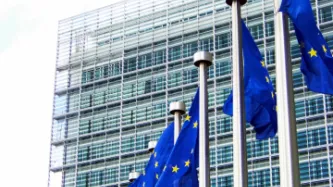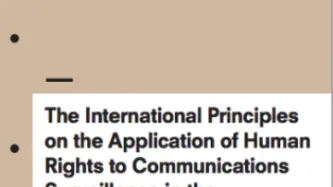Advanced Search
Content Type: News & Analysis
Australia’s intelligence agencies have beenconducting mass surveillance for more than half a century, routinely sharing the fruits of such labours with their Five Eyes allies in the US, UK, Canada and New Zealand. Australian spying facilities are staffed by the NSA and the UK’s GCHQ, and Australian intelligence officers are routinely tasked with work by their Five Eyes counterparts. Australia and its allies have infiltrated every aspect of the modern global communications…
Content Type: News & Analysis
Last week, we learned that the National Security Agency is gathering nearly 5 billion records a day on the whereabouts of mobile phones where ever they are in the world. The report from of the Washington Post, shows the extraordinary scale and reach of the NSA programs that attempt to know everything about us including our location, at any time.
Unfortunately, a scaled down version of this system is also being sold by private surveillance contractors to the highest bidder. The…
Content Type: News & Analysis
News that the United Nations is using drones (unmanned aerial vehicles) to collect information in the troubled east of the Democratic Republic of Congo (DRC) illustrates the growing use – and acceptance - of surveillance technologies in humanitarian operations.
The deployment of two drones by the UN Stabilisation Mission (MONUSCO) in the DRC last week, to assist the Mission in fulfilling its mandate to protect civilians, had been long foreshadowed, with requests for their use in the…
Content Type: News & Analysis
Just a few weeks ago, thousands of Argentinians had their privacy rights violated when the country’s electoral registration roll, which had been made available online, experienced a major leak of personal data following the presidential election.
Despite some early warnings on the weaknesses of the system, the government did nothing to fix the situation, allowing serious technical flaws in an online system to persist and refusing to respond to the crisis, further…
Content Type: News & Analysis
What is the Wassenaar Arrangement?
The Wassenaar Arrangement on Export Controls for Conventional Arms and Dual-Use Goods and Technologies (the "Wassenaar Arrangement") is a multilateral export control regime in which 41 states participate.
The Wassenaar Arrangement was established on 12 July 1996 in Wassenaar, the Netherlands by 33 founding members to contribute to regional and international security and stability. It is the successor to COCOM, a NATO based…
Content Type: News & Analysis
Update:
After an initial discussion with technical and government experts involved in drafting and negotiating the new controls on “intrusion software”, some of our initial questions have been clarified. To read what they had to say, go here.
One of the major dangers of imposing export controls on surveillance systems is the risk of overreach. While you want the scope of the systems being controlled and the language to be wide enough to catch the targeted product and its variants, you also…
Content Type: News & Analysis
Update:
After an initial discussion with technical and government experts involved in drafting and negotiating the new controls on “intrusion software”, some of our initial questions have been clarified. To read what they had to say, go here.
One of the major dangers of imposing export controls on surveillance systems is the risk of overreach. While you want the scope of the systems being controlled and the language to be wide enough to catch the targeted product and its…
Content Type: News & Analysis
Two new categories of surveillance systems were added into the dual-use goods and technologies control list of the Wassenaar Arrangement last week in Vienna, recognising for the first time the need to subject spying tools used by intelligence agencies and law enforcement to export controls.
While there are many questions that still need to be answered, Privacy International cautiously welcomes these additions to the Wassenaar Arrangement. Undoubtedly, these new…
Content Type: News & Analysis
A strong, unified voice from the tech industry is absolutely essential to reforming the mass and intrusive surveillance programs being run by the Five Eyes, so we welcome today's statement from AOL, Apple, Google, Facebook, LinkedIn, Microsoft, Twitter, and Yahoo.
Companies have obligations to respect human rights and not be complicit in mass surveillance. Given what has been publicly revealed over the past six months, we must know for certain that the companies we entrust with our information…
Content Type: News & Analysis
The following was a speech given by Carly Nyst, Head International Adovacy, at the UN Forum on Business and Human Rights, Geneva on 3 December
The internet and innovations in technologies have opened up previously unimagined possibilities for communication, expression, and empowerment. New technologies have become essential enablers of the enjoyment of human rights, from the right to education, to participation, to access to information. Today, the internet is not only a place where rights are…
Content Type: News & Analysis
The proliferation of private companies across the world developing, selling and exporting surveillance systems used to violate human rights and facilitate internal repression has been largely due to the lack of any meaningful regulation.
But a huge step toward finally regulating this billion-dollar industry was taken this week, when on Wednesday night the 41 countries that make up the Wassenaar Arrangement, the key international instrument that imposes controls on the export of…
Content Type: Long Read
The recent revelations, made possible by NSA-whistleblower Edward Snowden, of the reach and scope of global surveillance practices have prompted a fundamental re- examination of the role of intelligence services in conducting coordinated cross-border surveillance.
The Five Eyes alliance of States – comprised of the United States National Security Agency (NSA), the United Kingdom’s Government Communications Headquarters (GCHQ), Canada’s Communications Security Establishment Canada (CSEC), the…
Content Type: News & Analysis
Through the Aiding Privacy project, Privacy International is promoting the development of international standards around data protection in the humanitarian and development fields and working with relevant organisations to make this happen.
A new contribution towards this goal, Protecting Beneficiary Privacy: Principles and operational standards for the secure use of personal data in cash and e-transfer programmes, was released last week by the Cash Learning Partnership (CaLP) and…
Content Type: Press release
Privacy International today has filed a complaint with the Australian Inspector-General of Intelligence Security, calling for an immediate investigation into deeply troubling reports that the Australian intelligence services offered to violate the privacy rights of millions of citizens by handing over bulk metadata to its Five Eye partners.
According to the leaked Five Eyes memo published in the Guardian on 2 December, the Australian Signals Directorate, during a meeting…
Content Type: News & Analysis
The following is an excerpt from a Comment originally publihsed by The Guardian, written by Privacy International's Head of Research, Eric King:
As the global public reels from yet another Snowden revelation – this time, that the US and UK intelligence forces have hacked into and planted spyware on more than 50,000 computer networks worldwide – the hypocrisy of the US and British governments is brought into sharp relief. Less than four years ago Hillary Clinton, chastising China, declared that…
Content Type: News & Analysis
We, and other privacy advocates, havecriticised the poor provisions of the so-called Safe Harbour agreement, which allows free transfers of personal information from European countries to companies in the United States that have signed up and promise to abide by its Principles. Now the European Commission, prompted by the recent mass surveillance scandals, has published an investigation into this agreement which provides overwhelming evidence that it is not fit for purpose. It…
Content Type: Report
The recent revelations, made possible by NSA-whistleblower Edward Snowden, of the reach and scope of global surveillance practices have prompted a fundamental re-examination of the role of intelligence services in conducting coordinated cross-border surveillance.
The Five Eyes alliance of States – comprised of the United States National Security Agency (NSA), the United Kingdom’s Government Communications Headquarters (GCHQ), Canada’s Communications Security Establishment Canada (CSEC), the…
Content Type: News & Analysis
Let's be clear: private surveillance companies are not just selling a product. Companies do not merely pack their product into a box and put it in the post. More often than not, surveillance firms sell a consultancy service, one that actively provides pre-sale consultancy, installation of the product, and training on how to operate the technology. When the product breaks, companies often provide ongoing technical support, with some companies sending over of consultants for up to 18 months to…
Content Type: News & Analysis
With the launch of the "Eyes Wide Open" project, Privacy International has put together a fact sheet about the secretive Five Eyes alliance. Consider this a guide to the secret surveillance alliance that has infiltrated every aspect of the modern global communications system.
Beginning in 1946, an alliance of five English-speaking countries (the US, the UK, Australia, Canada and New Zealand) developed a series of bilateral agreements over more than a decade that became known as the UKUSA…
Content Type: News & Analysis
For nearly 30 years, the UK's wiretapping laws have been the subject of annual reports. Since 2002, they are available around the web (for now), but earlier than that, it is a rabbit warren of possible locations.
In practice, the reports are solely available from the Parliamentary Archives if and only if you are a member of an institution which has paid for access. Requesting a copy from elsewhere sends you to this destination.
The current Interception of Communications Commissioner didn't…
Content Type: Press release
The United Nations General Assembly should approve a new resolution and make clear that indiscriminate surveillance is never consistent with the right to privacy, five human rights organizations said in a November 21, 2013 letter to members of the United Nations General Assembly.
After heated negotiations, the draft resolution on digital privacy initiated by Brazil and Germany emerged on November 21 relatively undamaged, despite efforts by the …
Content Type: News & Analysis
The following is an excerpt from a blog post that originally was published by EJIL: Talk!, and is written by Carly Nyst, Head of International Advocacy at Privacy International:
The recent revelations of global surveillance practices have prompted a fundamental re-examination of the role and responsibility of States with respect to cross-border surveillance. The patchwork of secret spying programmes and intelligence-sharing agreements implemented by parties to the Five Eyes arrangement (the US…
Content Type: News & Analysis
Humanitarian agencies are collecting personal information for Syrians caught in the crossfire of a drawn-out and bloody civil war. Indeed, refugees fleeing persecution and conflict, need to access services and protection offered by the world’s humanitarian community. But in the rush to provide necessary aid to those afflicted by the crisis in Syria, humanitarian organisations are overlooking a human right that also needs protecting: the right to privacy.
Humanitarian and aid agencies are…
Content Type: News & Analysis
If you were a Middle Eastern tyrant or a Central Asian strongman, and you suddenly found your position of power under threat, where would turn for assistance? Well, Paris, it seems, is actually pretty good start.
This week, the city that gave us a defining revolution based on the very idea that we as human beings are entitled to certain universal rights, plays host to some 1,000 exhibitors and 30,000 attendees as part of Milipol 2013, one of the world’s foremost trade shows for law enforcement…
Content Type: News & Analysis
On at least two separate occasions, the South African government has provided funding to a well-resourced surveillance company for the development of mass surveillance technologies, the very equipment found to be used by the Gaddafi's repressive military regime in Libya, according to documents uncovered by Privacy International.
In February 2008, sandwiched between funding for a mechanical grape conveyor belt, and funding to improve gear changing and engine efficiency, the South African…
Content Type: News & Analysis
Privacy International is pleased to announce the Surveillance Industry Index, the most comprehensive publicly available database on the private surveillance sector.
Over the last four years, Privacy International has been gathering information from various sources that details how the sector sells its technologies, what the technologies are capable of and in some cases, which governments a technology has been sold to. Through our collection of materials and brochures at surveillance trade…
Content Type: Report
Privacy International is grateful to the students and staff of the Hebrew University of Jerusalem Faculty of Law Clinical Legal Education Centre, for providing research assistance to this paper.
The advent of new technologies and the Internet have provided new challenges to long-standing human rights norms. By facilitating increased State surveillance and intervention into individuals’ private lives, the spread of digital technologies has created a serious need for States to update their…
Content Type: News & Analysis
In a move that echoes strong action taken in the past by European officials to protect privacy, the Belgian and Dutch data protection authorities on Wednesday announced that they will begin an investigation into the security of the SWIFT financial system.
The announcement comes on the heels of our letters to twenty-eight European DPAs last month, which sought answers regarding the NSA's reportedly unauthorized access to SWIFT's financial messaging system and asked for an…
Content Type: News & Analysis
Privacy International today is proud to announce our new project, Aiding Privacy, which aims to promote the right to privacy and data protection in the development and humanitarian fields. Below is an outline of the issues addressed in our new report released today, Aiding Surveillance.
New technologies hold great potential for the developing world. The problem, however, is that there has been a systematic failure to critically contemplate the potential ill effects of deploying technologies in…
Content Type: News & Analysis
It was a throwaway line in a Washington Post article, one of the many stories about government surveillance in the past few months.
By September 2004, a new NSA technique enabled the agency to find cellphones even when they were turned off. [Joint Special Operations Command] troops called this “The Find,” and it gave them thousands of new targets, including members of a burgeoning al-Qaeda-sponsored insurgency in Iraq, according to members of the unit."
Being able to track a mobile phone,…


























